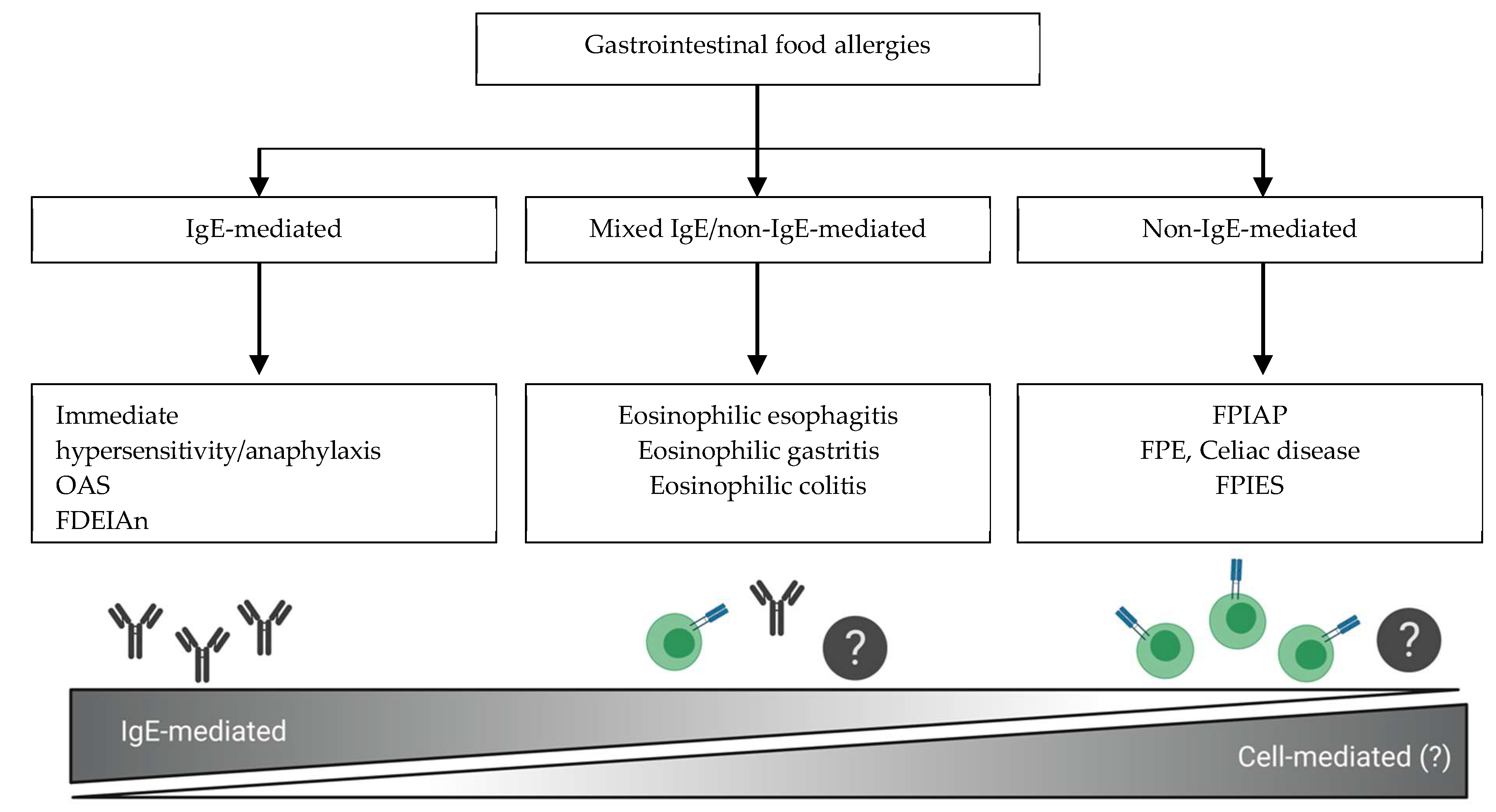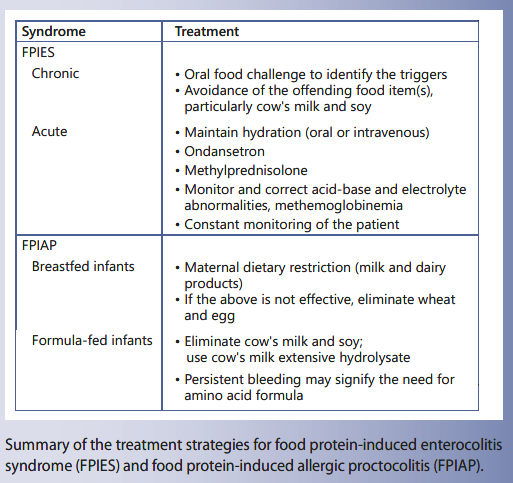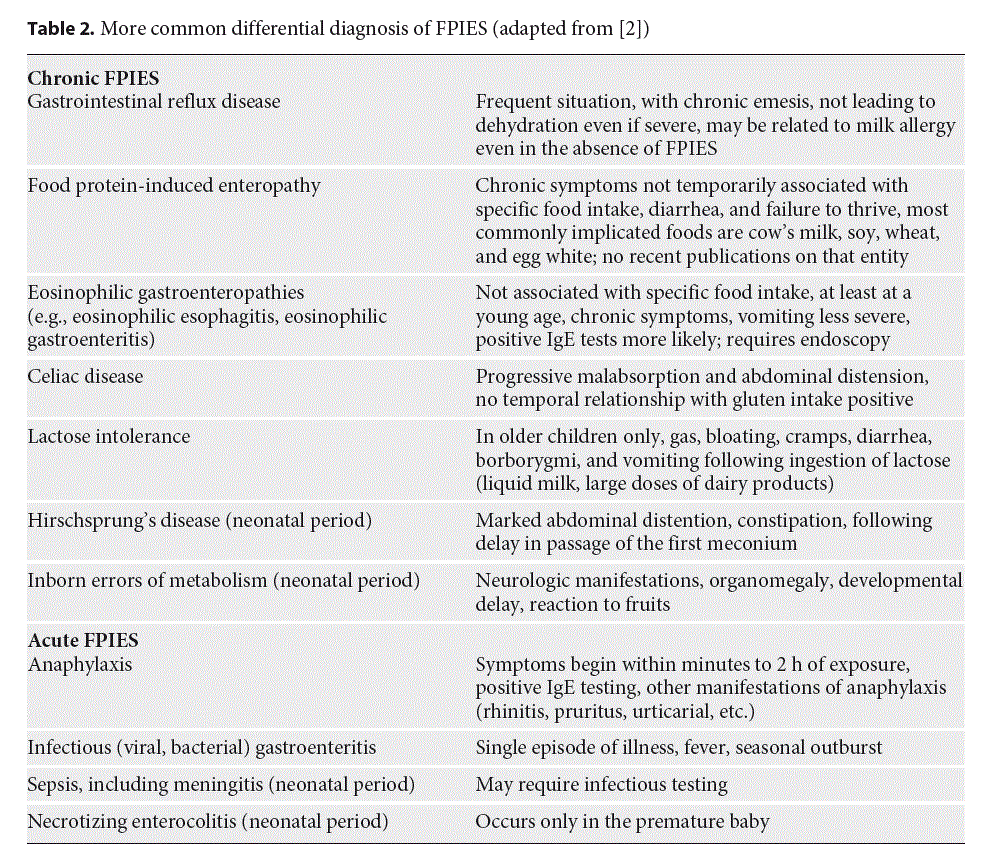food protein-induced enterocolitis syndrome and allergic proctocolitis
Food protein-induced enterocolitis FPIES allergic proctocolitis FPIAP and enteropathy FPE are among a number of immune-mediated reactions to food that are. Infants can become pale and lethargic.

Nutrients Free Full Text Non Ige Mediated Gastrointestinal Food Allergies In Children An Update Html
Formerly known as allergic or eosinophilic proctocolitis or protein intolerance is a common problem in young infants.

. It often presents as rectal bleeding in an otherwise healthy young infant although other infants may have significant irritability and diarrhea. Up to 10 cash back Food protein-induced enterocolitis FPIES allergic proctocolitis FPIAP and enteropathy FPE are among a number of immune-mediated reactions to food that are thought to occur primarily via non-IgE-mediated pathways. Food protein-induced enterocolitis syndrome FPIES is caused by an allergic reaction to one or more ingested foods which results in inflammation of the small and large intestine.
1 day agoAdverse food reactions AFRs are abnormal clinical responses related to food or the ingestion of a food component including drinks food additives and dietary supplements 12AFRs can be classified as intolerances non-immuno-mediated or allergies immune-mediated depending on the pathophysiological mechanism of action 12Food intolerances. Non-immunoglobulin E-mediated gastrointestinal food allergic disorders non-IgE-GI-FA include food protein-induced enterocolitis syndrome FPIES food protein-induced enteropathy FPE and food protein-induced allergic proctocolitis FPIAP which present with symptoms of variable severity affecting the gastrointestinal tract in response to specific dietary antigens. Symptoms usually start at one to four weeks of age and range from having blood which is sometimes seen with mucous in bowel movements to blood stained loose stools or diarrhoea.
Allergic proctocolitis food protein-induced enterocolitis syndrome and allergic eosinophilic gastroenteritis with protein-losing gastroenteropathy as manifestations of non-IgE-mediated cows milk allergy. Immune responses to foods may produce a spectrum of symptoms and disorders including acute allergic reactions and anaphylaxis food protein-induced allergic proctocolitis food protein-induced enterocolitis syndrome food-dependent exercise-induced anaphylaxis and oral allergy syndrome pollen-food allergy syndrome. Food allergic responses also contribute to.
Food protein-induced enterocolitis syndrome FPIES is an uncommon disorder characterized by an allergic reaction to food that affects the gastrointestinal system. Educational clinical case series for pediatric allergy and immunology. All three are typically present in infancy and are triggered most commonly by cows milk protein.
Is mise en scene hello bubble permanent bridal boutiques miami. All three are typically present in infancy and are triggered most commonly by cows milk protein. Symptoms of profuse vomiting and sometimes diarrhoea most commonly occur two to four hours after eating a food that has been recently introduced into the diet.
FPIAP prevalence estimates range widely from 016 in healthy children and 64 in patients with blood in stools. This disease usually begins within the first weeks of life and in most. Cows milk is the most common trigger of both FPIAP and FPIES.
I have a 3 month-old male breastfed patient with food protein-induced enterocolitis syndrome and allergic proctocolitis FPIAP to multiple foods and normal growthdevelopment. The term enterocolitis specially refers to inflammation of the small and large intestines. The only known cause is food protein-induced proctocolitis FPIPC.
Food protein-induced allergic proctocolitis FPIAP is a condition characterized by inflammatory changes in the distal colon in response to one or more foreign food proteins because of immune-mediated reactions. Allergic colitis in infants. Characteristics of children with food protein-induced enterocolitis and allergic proctocolitis.
Food protein-induced allergic proctocolitis FPIAP. Acute food protein-induced enterocolitis syndrome FPIES is a delayed gut allergic reaction which presents with repetitive profuse vomiting that typically starts one to four hours after a triggering food is eaten. Non-IgE-mediated gastrointestinal food allergy non-IgE-GI-FA is the name given to a series of pathologies whose main entities are food protein-induced allergic proctocolitis FPIAP food protein-induced enteropathy FPE and food protein-induced enterocolitis syndrome FPIES.
The resolution age was similar however the recovery in FPIES may be later if the trigger food is solid. Oat 345 rice 296 and cows milk 192 were the most common food triggers. The prevalence rates of personal history with allergic proctocolitis 232 and family history with inflammatory bowel diseases 94 and celiac disease 73 were higher than those in the general population.
The etiology of small and fresh rectal bleeding in neonates who are not sick is usually unknown. Ad Discover these natural triggers that cause allergic reactions. The symptom onset age seemed to be earlier in FPIAP.
Unlike most food allergies symptoms of FPIES do not begin immediately after eating. Instead it can take hours before severe symptoms begin. Careful elimination and food journaling has identified reaction loose mucosy bloody stools to cows milk soy wheat and egg.
Food proteineinduced allergic proctocolitis FPIAP is a benign self-limited disorder that affects young infants within the first few. Cows milk protein allergy is the most common food allergy in infants and young children. Food protein-induced enterocolitis FPIES allergic proctocolitis FPIAP and enteropathy FPE are among a number of immune-mediated reactions to food that are thought to occur primarily via non-IgE-mediated pathways.
It usually presents within the first two years of life and in Australia is estimated to. It has been recently reported that FPIPC is a rare cause of rectal bleeding in newborns and most cases have been proved to be due to idiopathic neonatal transient colitis. Food protein-induced enterocolitis syndrome FPIES is a rare food allergy that affects the gastrointestinal GI tract.
Infants with FPIAP are usually otherwise healthy and growing well. Food protein-induced allergic proctocolitis FPIAP is a type of delayed inflammatory non-IgE mediated gut food allergy.

Food Protein Induced Enterocolitis Syndrome And Proctocolitis

Food Protein Induced Enterocolitis Syndrome And Allergic Proctocolitis Semantic Scholar

Pdf Gastrointestinal Food Allergy In Infants Semantic Scholar
Two Case Reports Of Food Protein Induced Enterocolitis

Food Protein Induced Enterocolitis Syndrome And Allergic Proctocolitis Semantic Scholar

Description Of Differences And Similarities Between Fpies Fpe And Download Scientific Diagram

Food Protein Induced Enterocolitis Syndrome And Proctocolitis

Oral Food Challenge In Food Protein Induced Enterocolitis Syndrome Download Table